- Home
- Stephanie Laurens
An Unwilling Conquest Page 7
An Unwilling Conquest Read online
Page 7
“Well raced.” Harry’s gaze was on the horses and riders as they slowed and turned back to the gates.
Lucinda grasped the moment to study him. He was intent on observation, green eyes keenly assessing, shrewdly calculating. For an instant, she saw him clearly, his features unguarded. He was a man who, despite all other distractions in his life, was totally devoted to his chosen path.
He turned his head at that moment. Their eyes met, their gazes locked. He was standing on the step below her so her eyes were almost level with his. For a moment, he said nothing, then his lips twisted wrily.
Lucinda suppressed a delicate shiver.
With a gesture, Harry indicated the crowded lawns before them. “If you truly want to experience a race-meet, then you have to promenade.”
Her own lips curving, Lucinda inclined her head. “Lead on, Mr Lester—I’m entirely in your hands.”
She saw his brow quirk but pretended ignorance. On his arm, she descended the steps and exited the private enclosure.
“The Jockey Club maintains the stand for the use of its members,” Harry informed her when she glanced back.
Which meant he was a well-known member. Even Lucinda had heard of the pre-eminence of the Jockey Club. “I see. The races are run under their auspices, I take it?”
“Correct.”
He led her on a slow perambulation through the milling crowds. Lucinda felt distinctly round-eyed—she wanted to see everything, understand the fascination that drew so many gentlemen to Newmarket.
The same fascination that drove Harry Lester.
He showed her the bookmakers, each surrounded by knots of punters eager to lay their bets. They paraded before the tents and pavilions; again and again they were stopped by some acquaintance of Harry’s, keen to exchange a few words. Lucinda was prepared to be on her guard, but she encountered nothing but polite deference in the glances thrown her way; all those who stopped to talk were disarmingly correct. Nevertheless, she felt no impulse to withdraw her hand from the security of her escort’s elbow, where he had tucked it, drawing her close. In the press of male bodies, it was unquestionably comforting to have Harry Lester by her side. There were, she discovered, some ladies present. “Some have a real interest in the sport—usually the older ones.” Relaxed, in his milieu, Harry glanced down at her. “Some of the younger ladies have a vested interest; their families, like mine, have a long-standing connection with the turf.”
Mouthing an “oh,” Lucinda nodded. There were other ladies, too, whom he had not seen fit to comment upon, who, she suspected, held dubious right to the title. The race-track, however, was an overwhelmingly male domain—every sub-category of the male population was certainly represented. Lucinda was quite sure she would have neither the courage nor the inclination to attend again—not unless Harry Lester was her escort.
“It’s nearly time for the next race. I must speak to Thistledown’s jockey.”
Lucinda nodded, conveying with a glance her intention of staying with him.
Harry threw her a brief smile then concentrated on forging a path to the mounting yard.
“She seems very lively, sir,” the jockey vouchsafed as he settled in the saddle. “But the competition’s stiff—Jonquil—that mare out of Herald—is a starter. And Caught by the Scruff, too. And some of them others are experienced racers—it’ll be a miracle if she wins, what with her fetlock just come good an’ all.”
Harry nodded. “Just let her go—let her set her own pace. We’ll consider this a trial, nothing more. Don’t cram her—and no whip.”
Lucinda left his side to pat the mare’s velvet muzzle; a huge, dark brown eye invited her understanding. Lucinda grinned. “Hopeless, aren’t they?” she crooned. “But you don’t want to listen to them—men are notoriously hopeless at judging women. They should never so presume.” From the corner of her eye, she saw Harry’s lips lift; he exchanged a glance with the jockey, who grinned. “You just go out there and win the race—then see how they react. I’ll see you in the winner’s circle.”
With a last pat for the mare, she turned and, with divine disregard for the expression on Harry Lester’s face, allowed him to lead her back to the stands.
He secured seats in the third row, almost opposite the post. Lucinda leaned forward, eagerly scanning the horses trotting towards the barrier. She waved when Thistledown appeared.
Harry, watching her, laughed.
“She’ll win—you’ll see.” With smug confidence, Lucinda sat back.
But when the horn sounded and the barrier was dropped, she leant forward again, eyes keenly searching the thundering charge for Harry’s colours of green and gold. So intent was she that she didn’t even notice she rose to her feet, in company with all the other spectators, as the horses rounded the bend. As they entered the straight, a gap appeared in their ranks—Thistledown shot through.
“There she is!” Lucinda grabbed Harry’s arm. Only deeply entrenched decorum kept her from jigging up and down. “She’s winning!”
Harry was too riveted to answer.
But Thistledown was indeed showing the field a clean pair of heels. Halfway down the straight, her stride lengthened even more—she appeared to be flying when she flashed past the post.
“She won! She won!” Lucinda grasped both Harry’s arms and all but danced. “I told you she would!”
Rather more accustomed to the delights of victory, Harry looked down at her face, wreathed in smiles and lit by the same joy he still felt every time one of his horses came home first. He knew he was smiling, as delighted as she if rather more circumspect in showing it.
Lucinda turned back to locate Thistledown, now being led from the course. “Can we go and see her now?”
“Indeed we can.” Harry took her hand and tucked it tightly in his arm. “You promised to meet her in the winner’s circle, remember?”
Lucinda blinked as he steered her out of the crowded stand. “Is it permissible for ladies to enter the winner’s circle?”
“There’s no rule against it—in fact—” Harry slanted a glance at her “—I suspect the Head of the Committee will be delighted to see you.” When she shot him a suspicious glance, he laughed and urged her on. Once out of the enclosure and free of those members keen to press their congratulations, a path cleared before them, leading directly to the roped arena where Thistledown, shiny coat flickering but clearly untired by her dash, waited patiently.
As soon as Lucinda emerged from the crowd, the mare pushed her head forward, dragging on the reins to get to Lucinda’s side. Lucinda hurried forward, crooning her praises. Harry looked on indulgently.
“Well, Lester! Another trophy for your mantel—surprised it hasn’t collapsed.”
Harry turned as the President of the Jockey Club, present Head of the Race Committee, appeared at his elbow. In his hands, he held a gold-plated statuette in the shape of a lady.
“Remarkable run—truly remarkable.”
Shaking hands, Harry nodded. “Particularly as she’s just recovered from a strained fetlock—I wasn’t sure I’d race her.”
“Just as well you did.” The President’s eye was on the horse and the woman apparently chatting to the beast. “Nice conformation.”
Harry knew very well that Lord Norwich was not referring to the mare. “Indeed.” His tone was dry; Lord Norwich, who had known him from the cradle, lifted a brow at him.
Glancing at the statuette, Harry confirmed that the lady was indeed decently garbed, then nodded at Lucinda. “It was Mrs Babbacombe who delivered the inspirational address prior to the race. Perhaps she should accept the award on my behalf?”
“Excellent idea!” Beaming, Lord Norwich strode forward.
Shielded by her brimming happiness, the aftermath of fulfilled excitement, Lucinda had succeeded in blithely ignoring the avid interest of the spectators. Lord Norwich, however, was impossible to ignore. But Harry strolled forward to stand by their side, quieting her uncertainties.
Lord Norwich gave a
short speech, praising the mare and Harry’s stables, then gallantly presented the statuette—to her.
Surprised, Lucinda looked at Harry—he smiled and nodded.
Determined to rise to the occasion, she graciously thanked his lordship.
“Quite, quite.” His lordship was quite taken. “Need to see more game fillies at the track, what?”
Lucinda blinked at him.
Harry reached for her elbow and drew her to his side. He nodded at his strapper. “Take her back to the stables.”
With a last lingering look for Lucinda, Thistledown was led away. Lord Norwich and the rest of the crowd turned away, already intent on the next race.
Still conscious of the fading thrill, Lucinda looked around, then cast a glance upwards.
Harry smiled. “And you have my heartfelt thanks, too, my dear. For whatever magic you wove.”
Lucinda met his eyes—and stopped breathing. “There was no magic.” She felt his fingers on hers; she watched as he raised her hand and brushed his lips across the backs of her fingers. A long shiver traced its path down her spine, leaving an odd warmth in its wake. With an effort she veiled her eyes, breaking his spell. Catching her breath, she made a bid for her usual confidence; she raised the statuette and presented it to him, defiantly meeting his eyes.
He took it in his other hand, his gaze steady on hers.
Time lost its meaning; they stood, largely forgotten, in the centre of the winner’s circle. Men crowded about, jostling each other but not touching them. They stood close, so close the small ruffle on Lucinda’s bodice brushed the long lapel of Harry’s coat. He sensed its flutter as her breathing grew more rapid but he was lost in her eyes, in a world of misty blue. He watched them widen, darken. Her lips softened, parted. Her bodice made contact with his coat.
His head had begun its slow descent when sanity awoke—and frantically hauled on his reins.
Great heavens! They were in the winner’s circle at Newmarket!
Shaken to the depths of his soul, Harry dragged in a quick breath. He tore his gaze from her face, from the consternation that was filling her eyes, and the soft blush that had started to tinge her cheeks, and looked about them. No one, thank heaven, had seen.
His heart pounding, he took a firm grip of her elbow—and took refuge in action. “If you’ve seen enough of the racing, I should get you back to Em’s—she’ll be wondering where you are.”
Lucinda nodded—the faintly bored drawl left her no choice. She felt—she didn’t know what—shaken, certainly, but regretful, and resentful, too. But she couldn’t argue with his wish to be gone from here.
But they still had the gamut of well-wishers to run—they were stopped constantly, more than one gentleman wishing to make an offer for the mare.
Harry faced the hurdles with what patience he could, conscious that all he wished to do was escape. With her. But that was impossible—she was his danger, his Waterloo.
From now on, every time he looked into her face would be like looking down the barrel of a loaded gun. A weapon that could land him in painful slavery.
If he was wise, he wouldn’t look too frequently.
Lucinda sensed his withdrawal although he cloaked it well. His urbane charm came to the fore—but he would not meet her eyes, her puzzled glances.
They finally escaped the crowds and walked back, in silence, to the stables. He lifted her to his curricle and swung up beside her, his expression closed.
He drove back to Hallows Hall without a word, his apparent concentration on his horses a wall Lucinda made no attempt to breach.
But when he drew up before the steps and secured the reins, then came around and lifted her down, she held her position in front of him even though his hands fell immediately from her. “Thank you for a most…instructive morning, Mr Lester.”
His eyes flicked to hers; he took a step back. “A pleasure, Mrs Babbacombe.” He bowed with innate grace. “And now I must bid you adieu.”
Surprised, Lucinda watched as he swung up to the curricle’s seat. “But won’t you stay for luncheon? Your aunt would be delighted, I’m sure.”
The reins in his hands, Harry drew in a deep breath—and forced himself to meet her gaze. “No.”
The word hung between them—an unconditional denial. Harry saw the understanding in her eyes, sensed the sudden catch in her breathing as his rejection bit home. But it was better this way—to nip it in the bud before it could flower. Safer for her as well as for him.
But her eyes showed no comprehension of that, of the dangers he could see so clearly. Soft and luminous, they looked at him in hurt surprise.
He felt his lips twist in bitter self-mockery. “I can’t.”
It was all the explanation he could give. With a crack of his whip, he set his horses down the drive—and drove away.
Chapter Five
Three days later, Lucinda was still not satisfied that she understood what had happened. Seated in a wicker chair in a patch of sunlight in the conservatory, she idly plied her needle while her thoughts went round and round. Heather was out riding with Gerald, Sim in close attendance; her hostess was somewhere in the gardens, supervising the planting of a new border. She was alone, free to pursue her thoughts—little good though that seemed to be doing her.
She knew she was inexperienced in such matters, yet deep within lay an unshakeable conviction that something—something eminently to be desired—had sprung to life between herself and Harry Lester.
He had almost kissed her in the winner’s circle.
The moment was etched in her memories, frustratingly incomplete, yet she could hardly fault him for drawing back. But he had then retreated, so completely it had left her feeling unexpectedly vulnerable and inwardly bruised. His parting words confounded her. She could not misconstrue the implications of that “No”—it was his “I can’t” that truly baffled her.
He had not appeared since; courtesy of Gerald, who now haunted the house, she had learned he was still in Newmarket. Presumably, she was supposed to believe he was so immensely busy with his racers that he had no time for her.
With an inward snort, Lucinda jabbed her needle into the canvas. She was, she supposed, now too much the businesswoman to enjoy being shortchanged. But time was slipping away; she couldn’t remain at Hallows Hall forever. Clearly, if she wanted to know just what might be possible, she was going to have to take an active hand.
But how?
Five minutes later, Em entered through the garden door, the hem of her old gardening gown liberally splattered with earth, a pair of heavy gloves in one hand.
“Phoof!” Sinking into the other armchair, separated from Lucinda’s by a small matching table, Em pushed back wisps of browny-grey hair. “That’s done!” She slanted a glance at her guest. “You look very industrious—quite wifely, in fact.”
Lucinda smiled but did not look up.
“Tell me,” Em mused, her sharp gaze belying her idle tone. “Have you ever considered remarrying?”
Lucinda’s needle halted; she looked up, not at her hostess but through the long windows at the garden. “Not until recently,” she eventually said. And returned to her needlework.
Em studied her downbent head, a definite glint in her eye. “Yes—well, it takes one like that. Suddenly pops into your mind—and then won’t get out.” With an airy wave of her gardening gloves, she continued, “Still, with your qualifications I hardly think you need worry. When you get to London you’ll have a goodly selection of beaux lining up to put a ring on your finger.”
Lucinda slanted her a glance. “My qualifications?”
Em’s wave became a flourish. “Your breeding for one—nothing wrong with that, even if your parents were disowned. Your grandparents could hardly change the blood in their veins—as far as Society’s concerned that’s what counts.” As if just struck by the fact, Em added, “In fact, the Giffords are as well connected as the Lesters.”
“Indeed?” Lucinda eyed her warily.
B
lithely, Em continued, “And there’s your fortune, too—that legacy of yours would satisfy the most demanding. And you’re hardly an antidote—you’ve got style, that indefinable something—noticed it straight off. Once the Bruton Street mesdames get a look at you they’ll be vying for your custom, mark my words.”
“I am, however, twenty-eight.”
The blunt comment brought Em to a blinking halt. Turning her head, she stared at her guest. “So?”
Lucinda grimaced and looked down at her work. “Twenty-eight, I suspect, is somewhat long in the tooth to be attractive to town beaux.”
For an instant longer, Em stared at her, then hooted with laughter. “Rubbish, my dear! The ton’s awash with gentlemen whose principal reason for avoiding matrimony is that they cannot stomach the bright-eyed young misses.” She snorted. “More hair than wit, most of them, believe me.” She paused to study Lucinda’s face, half-averted, then added, “It’s very common, my dear, for men to prefer more experienced women.”
Lucinda glanced up—and met Em’s eye. A light blush slowly spread across her cheeks. “Yes, well—that’s another thing.” Her gaze flicked to the green vistas beyond the window as she dragged in a determined breath. “I’m not. Experienced, I mean.”
Em stared. “Not?”
“My marriage wasn’t really a marriage at all—it was a rescue.” Lucinda frowned, her gaze dropping to her tapestry. “You must remember I was only sixteen at the time—and Charles was nearing fifty. He was very kind—we were good friends.” Her voice low, she added, “Nothing more.” Straightening her shoulders, she reached for her scissors, “Life, I fear, has passed me by—I’ve been put back on the shelf without having been properly off it in the first place.”
“I…see.” Em blinked owlishly at the tips of her half-boots, peeking from beneath her dirtied hem. A broad smile slowly broke across her face. “You know—your…er, inexperience is not really a handicap, not in your case. In fact,” she continued, her old eyes lighting, “it could well be a positive advantage.”
It was Lucinda’s turn to look puzzled.

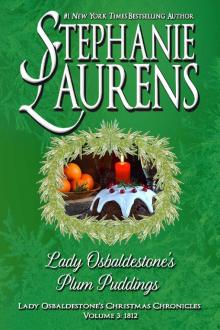 Lady Osbaldestone’s Plum Puddings: Lady Osbaldestone’s Christmas Chronicles Volume 3
Lady Osbaldestone’s Plum Puddings: Lady Osbaldestone’s Christmas Chronicles Volume 3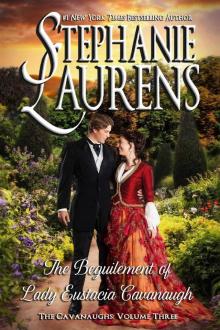 The Beguilement of Lady Eustacia Cavanagh: The Cavanaughs Volume 3
The Beguilement of Lady Eustacia Cavanagh: The Cavanaughs Volume 3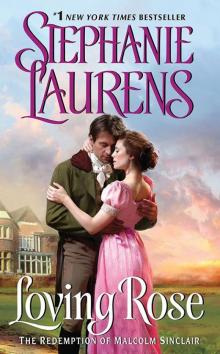 Loving Rose: The Redemption of Malcolm Sinclair (Casebook of Barnaby Adair)
Loving Rose: The Redemption of Malcolm Sinclair (Casebook of Barnaby Adair)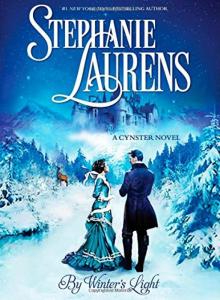 By Winter's Light
By Winter's Light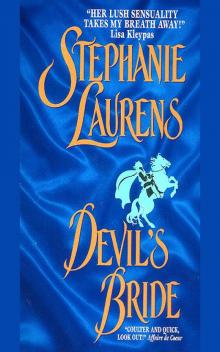 Devil's Bride
Devil's Bride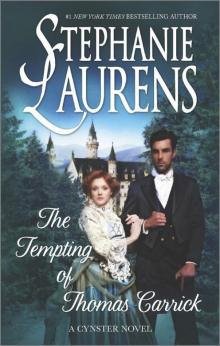 The Tempting of Thomas Carrick
The Tempting of Thomas Carrick![Cynster [22.00] A Match for Marcus Cynster Read online](http://i1.bookreadfree.com/i/03/16/cynster_[22_00]_a_match_for_marcus_cynster_preview.jpg) Cynster [22.00] A Match for Marcus Cynster
Cynster [22.00] A Match for Marcus Cynster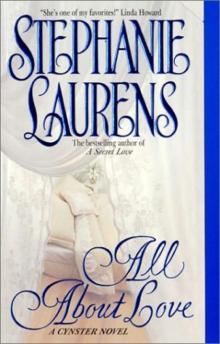 All About Love c-6
All About Love c-6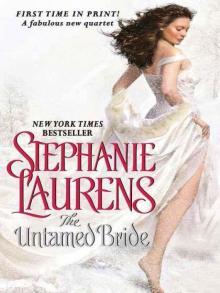 Cobra 01 The Untamed Bride
Cobra 01 The Untamed Bride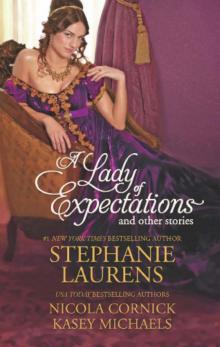 A Lady of Expectations and Other Stories
A Lady of Expectations and Other Stories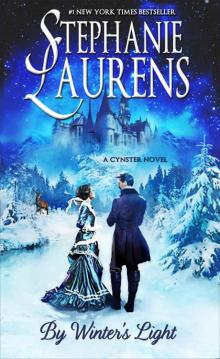 By Winter's Light_A Cynster Novel
By Winter's Light_A Cynster Novel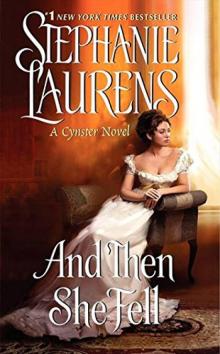 And Then She Fell
And Then She Fell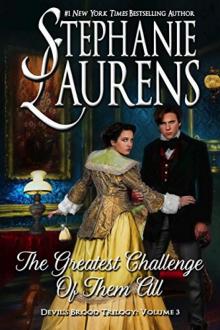 The Greatest Challenge of Them All
The Greatest Challenge of Them All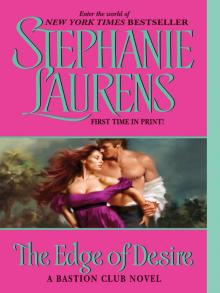 The Edge of Desire
The Edge of Desire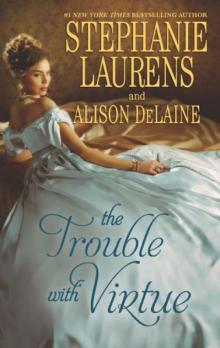 The Trouble With Virtue: A Comfortable WifeA Lady by Day
The Trouble With Virtue: A Comfortable WifeA Lady by Day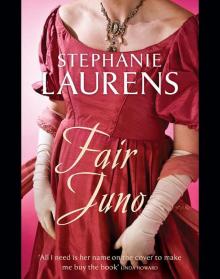 Fair Juno
Fair Juno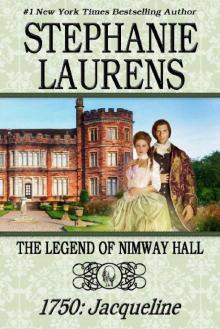 THE LEGEND OF NIMWAY HALL: 1750 - JACQUELINE
THE LEGEND OF NIMWAY HALL: 1750 - JACQUELINE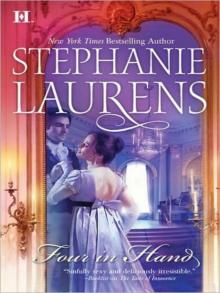 Four In Hand
Four In Hand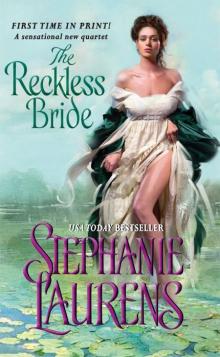 The Reckless Bride
The Reckless Bride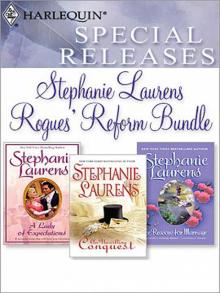 Stephanie Laurens Rogues' Reform Bundle
Stephanie Laurens Rogues' Reform Bundle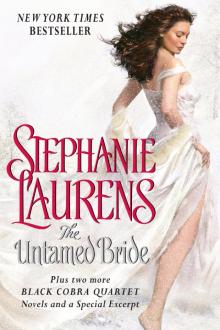 The Untamed Bride Plus Black Cobra 02-03 and Special Excerpt
The Untamed Bride Plus Black Cobra 02-03 and Special Excerpt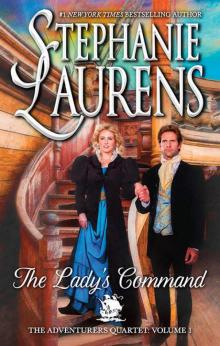 The Lady's Command (Adventurers Quartet #1)
The Lady's Command (Adventurers Quartet #1)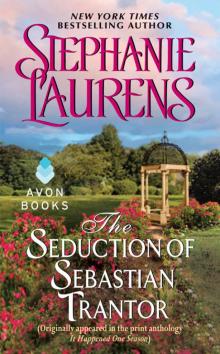 The Seduction of Sebastian Trantor
The Seduction of Sebastian Trantor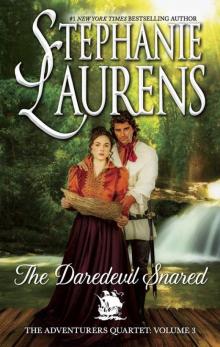 The Daredevil Snared (The Adventurers Quartet Book 3)
The Daredevil Snared (The Adventurers Quartet Book 3)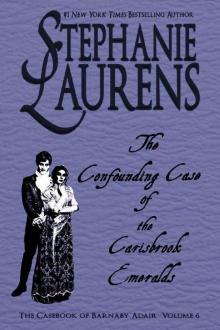 The Confounding Case Of The Carisbrook Emeralds (The Casebook of Barnaby Adair 6)
The Confounding Case Of The Carisbrook Emeralds (The Casebook of Barnaby Adair 6)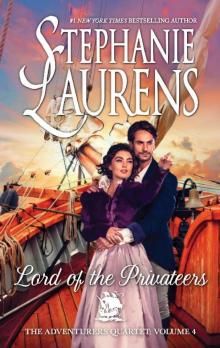 Lord of the Privateers (The Adventurers Quartet)
Lord of the Privateers (The Adventurers Quartet)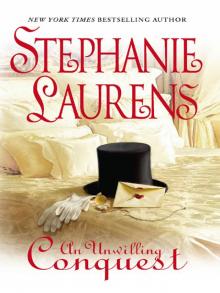 An Unwilling Conquest
An Unwilling Conquest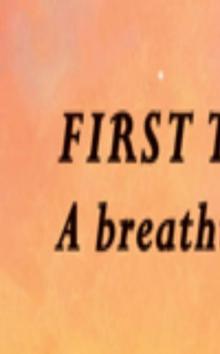 Brazen Bride
Brazen Bride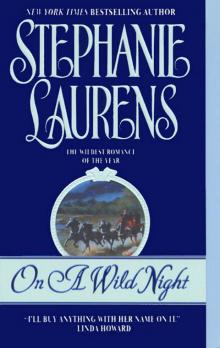 On a Wild Night
On a Wild Night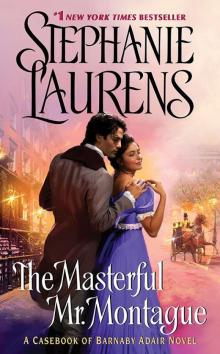 The Masterful Mr. Montague: A Casebook of Barnaby Adair Novel
The Masterful Mr. Montague: A Casebook of Barnaby Adair Novel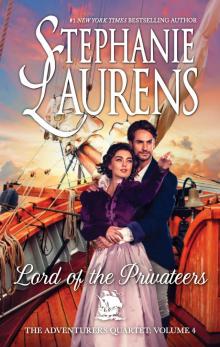 Lord of the Privateers
Lord of the Privateers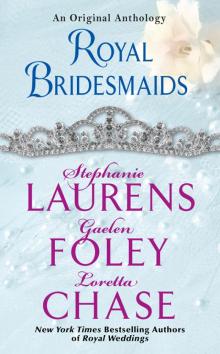 Royal Bridesmaids
Royal Bridesmaids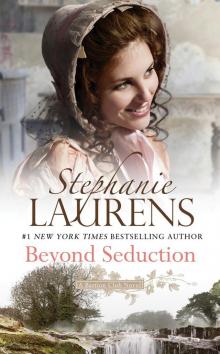 Beyond Seduction
Beyond Seduction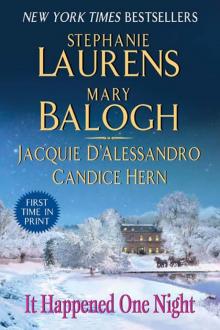 It Happened One Night
It Happened One Night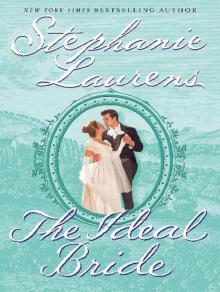 The Ideal Bride
The Ideal Bride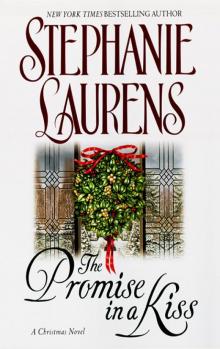 The Promise in a Kiss
The Promise in a Kiss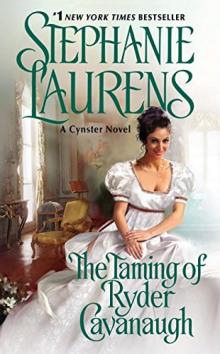 The Taming of Ryder Cavanaugh
The Taming of Ryder Cavanaugh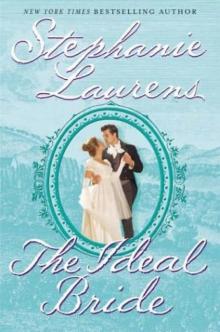 The Ideal Bride c-12
The Ideal Bride c-12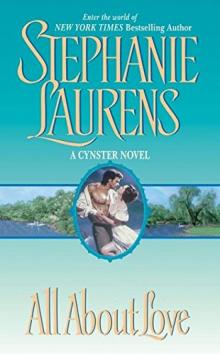 All About Love
All About Love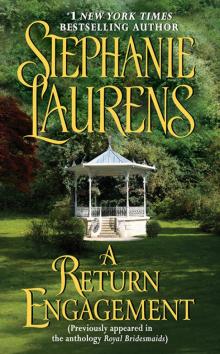 A Return Engagement
A Return Engagement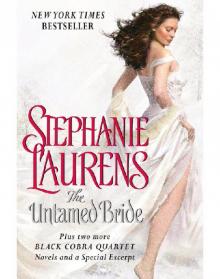 The Untamed Bride Plus Two Full Novels and Bonus Material
The Untamed Bride Plus Two Full Novels and Bonus Material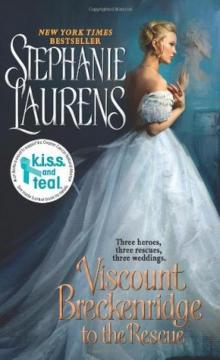 Viscount Breckenridge to the Rescue
Viscount Breckenridge to the Rescue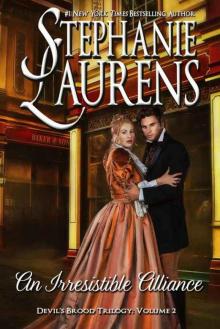 An Irresistible Alliance (Cynsters Next Generation Novels Book 5)
An Irresistible Alliance (Cynsters Next Generation Novels Book 5)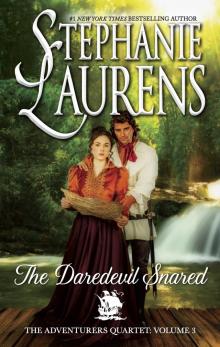 The Daredevil Snared
The Daredevil Snared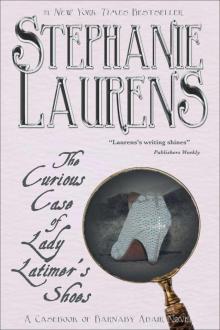 The Curious Case of Lady Latimer's Shoes: A Casebook of Barnaby Adair Novel
The Curious Case of Lady Latimer's Shoes: A Casebook of Barnaby Adair Novel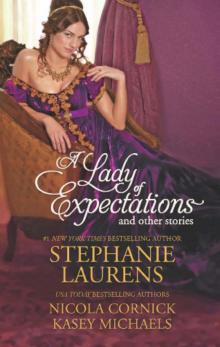 A Lady of Expectations and Other Stories: A Lady of ExpectationsThe Secrets of a CourtesanHow to Woo a Spinster
A Lady of Expectations and Other Stories: A Lady of ExpectationsThe Secrets of a CourtesanHow to Woo a Spinster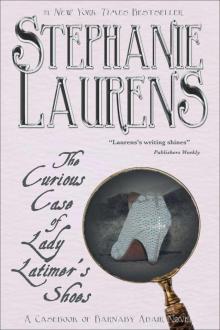 The Curious Case of Lady Latimer's Shoes: A Casebook of Barnaby Adair Novel (The Casebook of Barnaby Adair)
The Curious Case of Lady Latimer's Shoes: A Casebook of Barnaby Adair Novel (The Casebook of Barnaby Adair)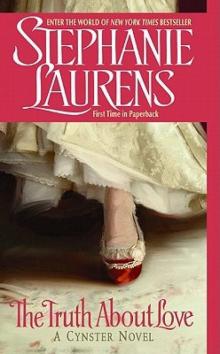 The Truth About Love
The Truth About Love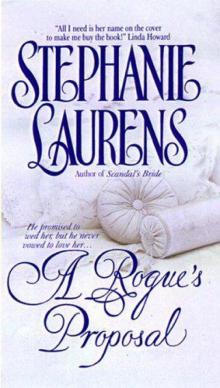 A Rogue's Proposal
A Rogue's Proposal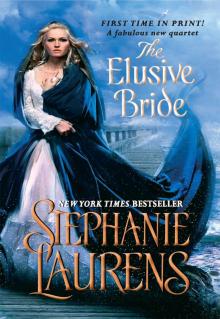 The Elusive Bride
The Elusive Bride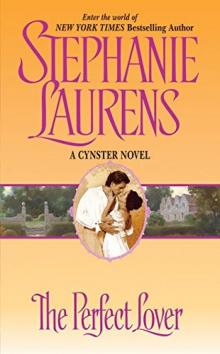 The Perfect Lover
The Perfect Lover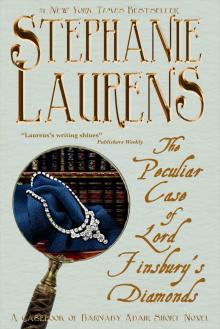 The Peculiar Case of Lord Finsbury's Diamonds: A Casebook of Barnaby Adair Short Novel
The Peculiar Case of Lord Finsbury's Diamonds: A Casebook of Barnaby Adair Short Novel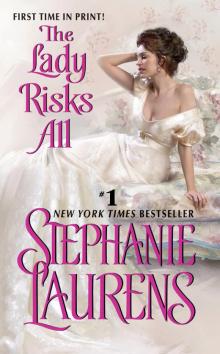 The Lady Risks All
The Lady Risks All The Murder at Mandeville Hall: The Casebook of Barnaby Adair: Volume 7
The Murder at Mandeville Hall: The Casebook of Barnaby Adair: Volume 7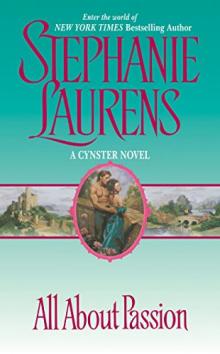 All About Passion
All About Passion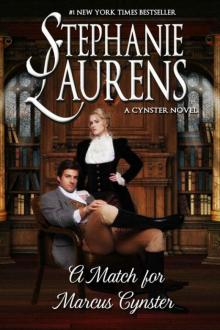 A Match for Marcus Cynster
A Match for Marcus Cynster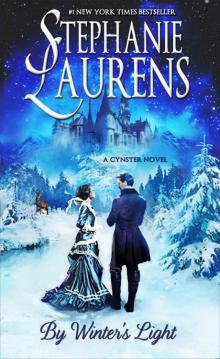 By Winter's Light: A Cynster Novel (Cynster Special Book 2)
By Winter's Light: A Cynster Novel (Cynster Special Book 2)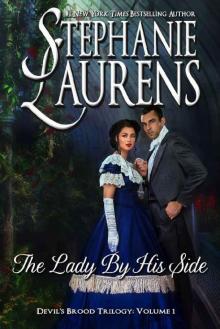 The Lady By His Side
The Lady By His Side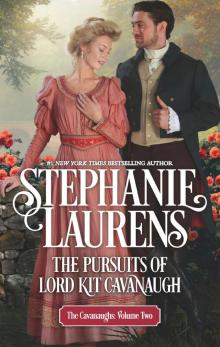 The Pursuits of Lord Kit Cavanaugh
The Pursuits of Lord Kit Cavanaugh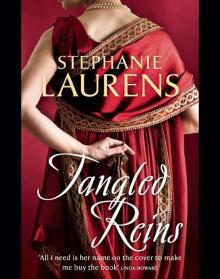 Tangled Reins
Tangled Reins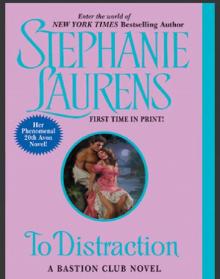 To Distraction
To Distraction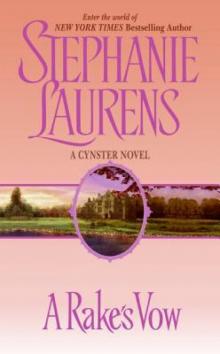 A Rake's Vow
A Rake's Vow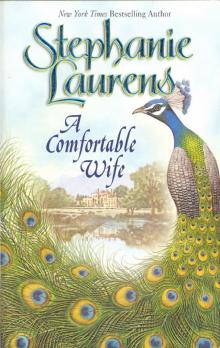 A Comfortable Wife
A Comfortable Wife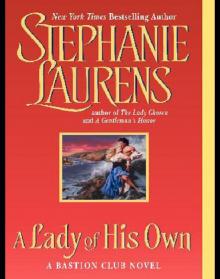 A Lady of His Own bc-3
A Lady of His Own bc-3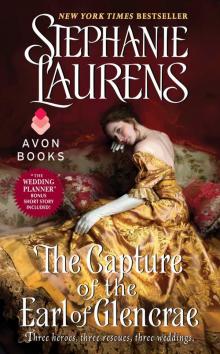 The Capture of the Earl of Glencrae
The Capture of the Earl of Glencrae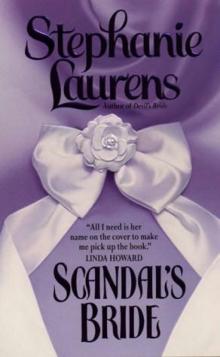 Scandals Bride c-3
Scandals Bride c-3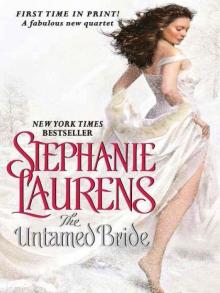 Untamed Bride
Untamed Bride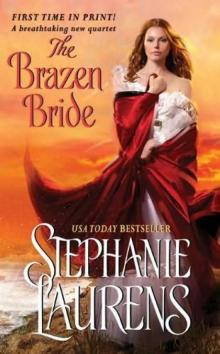 The Brazen Bride
The Brazen Bride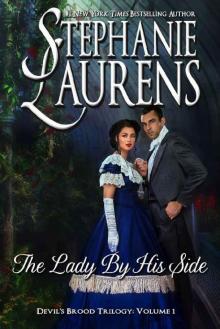 The Lady By His Side (Cynsters Next Generation Novels Book 4)
The Lady By His Side (Cynsters Next Generation Novels Book 4)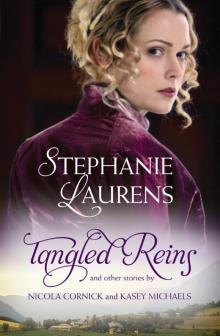 Tangled Reins and Other Stories
Tangled Reins and Other Stories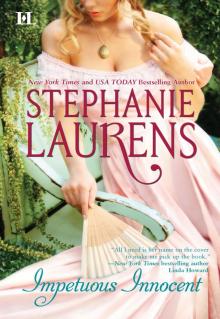 Impetuous Innocent
Impetuous Innocent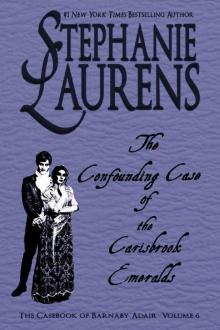 The Confounding Case Of The Carisbrook Emeralds
The Confounding Case Of The Carisbrook Emeralds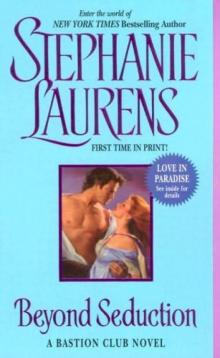 Stephanie Laurens - B 6 Beyond Seduction
Stephanie Laurens - B 6 Beyond Seduction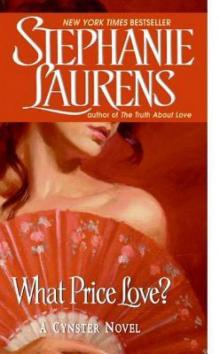 What Price Love?
What Price Love?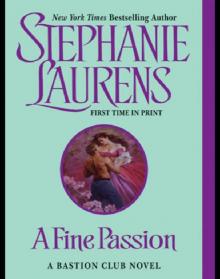 A Fine Passion
A Fine Passion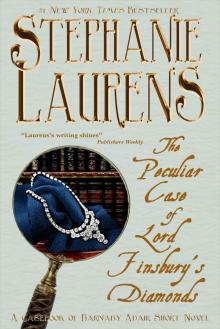 The Peculiar Case of Lord Finsbury's Diamonds: A Casebook of Barnaby Adair Short Novel (The Casebook of Barnaby Adair)
The Peculiar Case of Lord Finsbury's Diamonds: A Casebook of Barnaby Adair Short Novel (The Casebook of Barnaby Adair)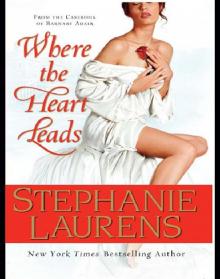 Where the Heart Leads
Where the Heart Leads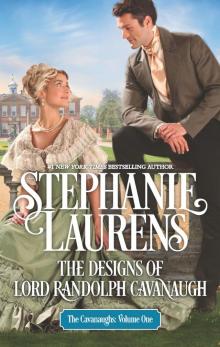 The Designs of Lord Randolph Cavanaugh
The Designs of Lord Randolph Cavanaugh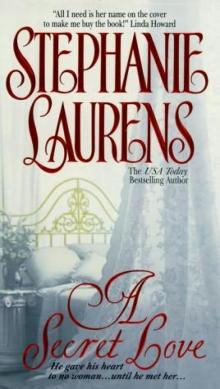 A Secret Love c-5
A Secret Love c-5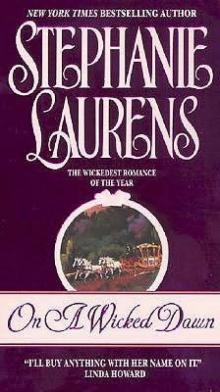 On a Wicked Dawn c-10
On a Wicked Dawn c-10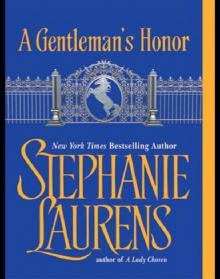 A Gentleman's Honor
A Gentleman's Honor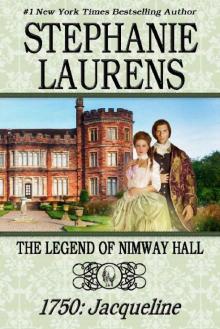 THE LEGEND OF NIMWAY HALL_1750_JACQUELINE
THE LEGEND OF NIMWAY HALL_1750_JACQUELINE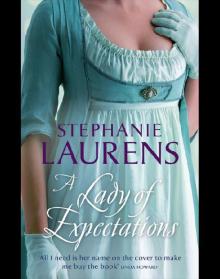 A Lady of Expectations
A Lady of Expectations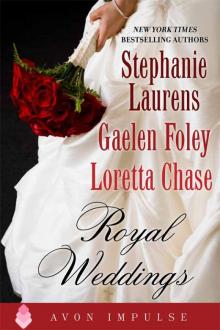 Royal Weddings: An Original Anthology
Royal Weddings: An Original Anthology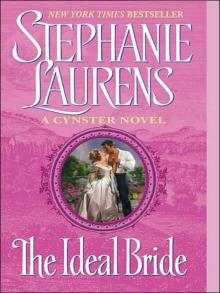 The Ideal Bride (Cynster Novels)
The Ideal Bride (Cynster Novels)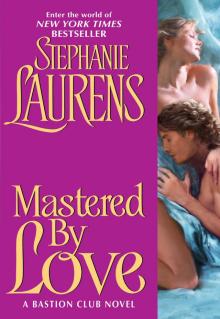 Mastered by Love
Mastered by Love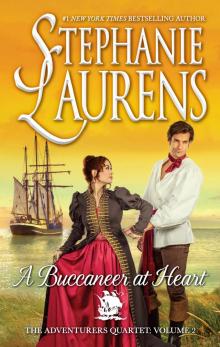 A Buccaneer at Heart
A Buccaneer at Heart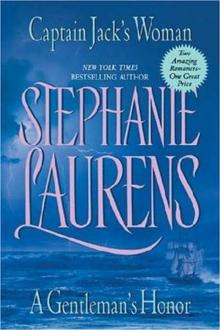 Captain Jack’s Woman / A Gentleman's Honor
Captain Jack’s Woman / A Gentleman's Honor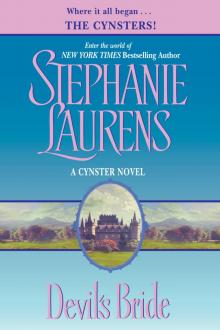 Devil's Bride with Bonus Material
Devil's Bride with Bonus Material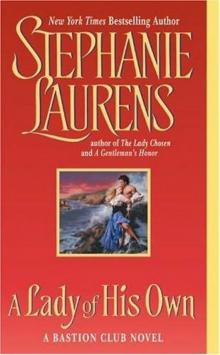 A Lady of His Own
A Lady of His Own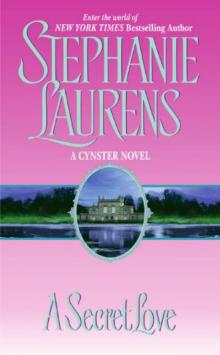 A Secret Love
A Secret Love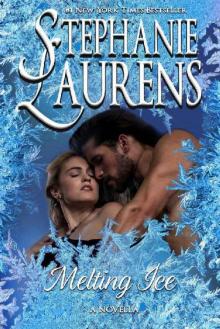 Melting Ice
Melting Ice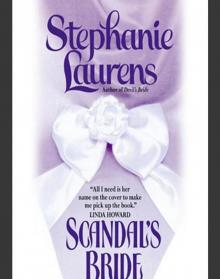 Scandal's Bride
Scandal's Bride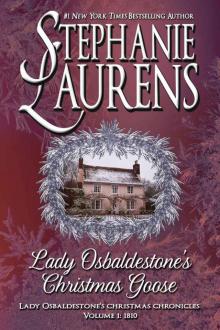 Lady Osbaldestone’s Christmas Goose
Lady Osbaldestone’s Christmas Goose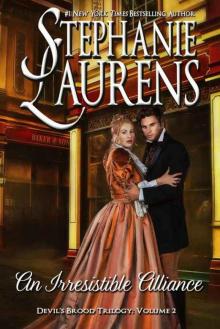 An Irresistible Alliance
An Irresistible Alliance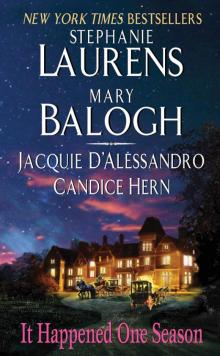 It Happened One Season
It Happened One Season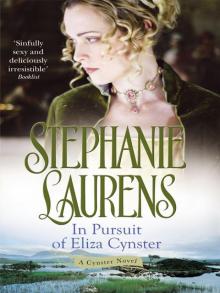 In Pursuit Of Eliza Cynster
In Pursuit Of Eliza Cynster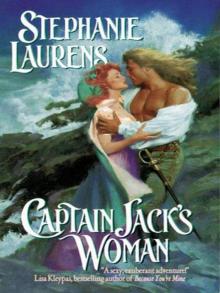 Captain Jack's Woman
Captain Jack's Woman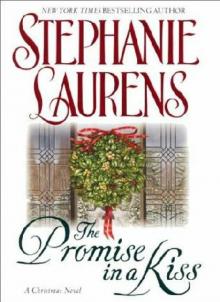 The promise in a kiss c-8
The promise in a kiss c-8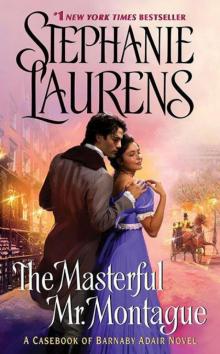 The Masterful Mr. Montague
The Masterful Mr. Montague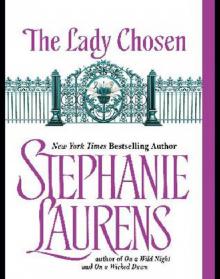 The Lady Chosen
The Lady Chosen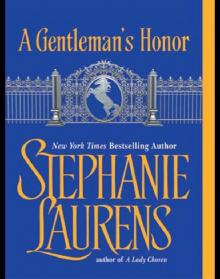 A Gentleman's Honor bc-2
A Gentleman's Honor bc-2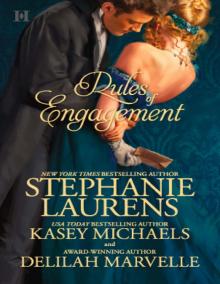 Rules of Engagement: The Reasons for MarriageThe Wedding PartyUnlaced (Lester Family)
Rules of Engagement: The Reasons for MarriageThe Wedding PartyUnlaced (Lester Family)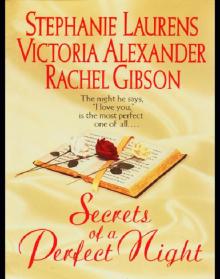 Secrets of a Perfect Night
Secrets of a Perfect Night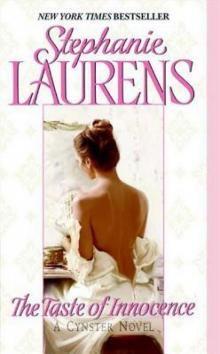 The Taste of Innocence
The Taste of Innocence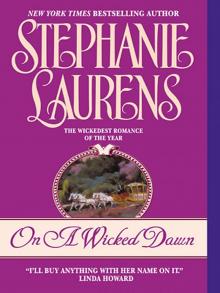 On A Wicked Dawn
On A Wicked Dawn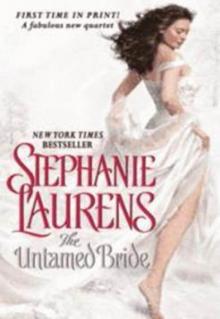 The Untamed Bride
The Untamed Bride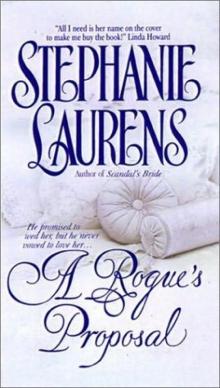 A Rogues Proposal c-4
A Rogues Proposal c-4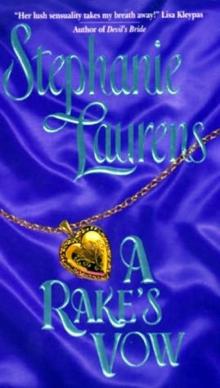 Rakes Vow c-2
Rakes Vow c-2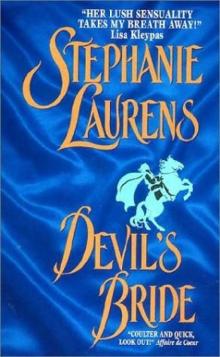 Devils Bride c-1
Devils Bride c-1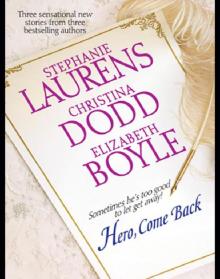 Hero, Come Back
Hero, Come Back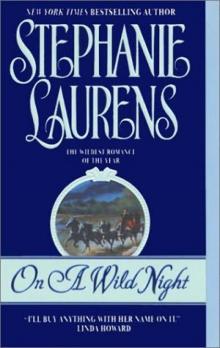 On a Wild Night c-8
On a Wild Night c-8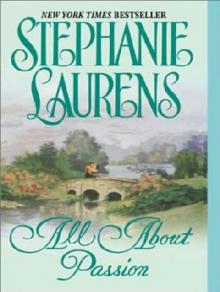 All About Passion c-7
All About Passion c-7